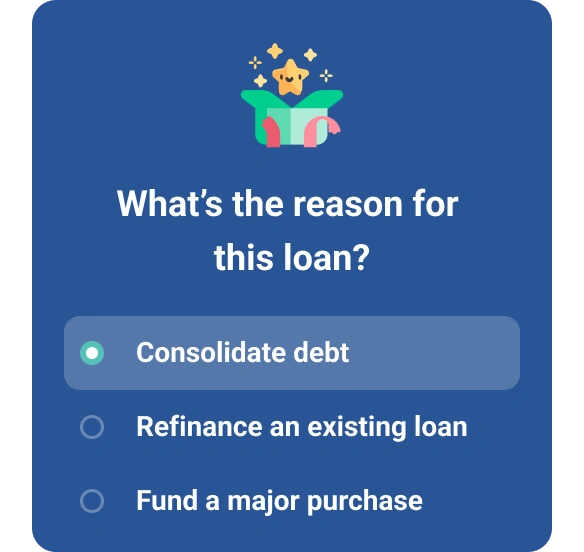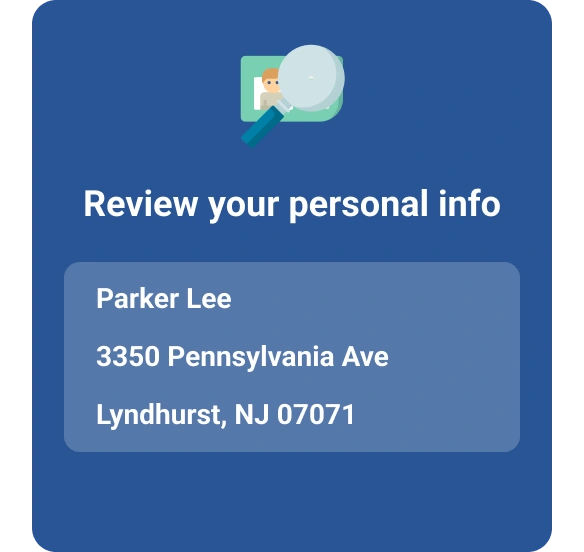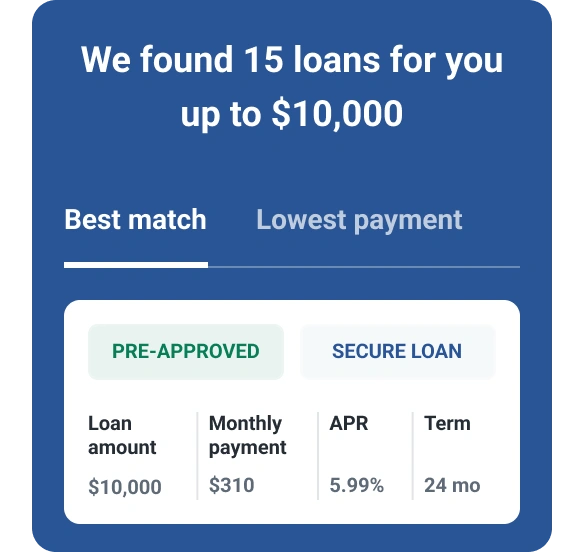Is a Debt Consolidation Loan Right For You?

A debt consolidation loan is a personal loan you can use to pay off high-interest debt, typically credit cards.
Consolidating debt allows you to use just one loan to pay off one or more credit card balances, which can simplify your repayment plan. And, depending on how much debt you have and the loan's terms, it could also save you time and money.
To decide if a debt consolidation loan is right for you, it's important to consider your individual financial situation and your financial goals. Here's what you should know.
When Debt Consolidation May Be a Good Option
You can use a personal loan for just about anything you want. But if you're thinking of using it as a debt consolidation loan, here are the times when it's worth considering:
- You already have a good credit score. Personal loans are available to borrowers across the credit spectrum. But if you want favorable terms and a low interest rate, you'll generally need at least a good credit score, which starts at a FICO® ScoreΘ of 670.
- You have high-interest debt. The average personal loan interest rate is 9.41%, according to Experian data. In contrast, the average credit card interest rate hovers around 16%. If you can qualify for a lower rate than what you're paying now, consolidating your debt could allow you to save some money on those interest charges.
- You have a repayment plan. One of the dangers of credit cards is that as a type of revolving credit, they allow you to borrow and pay off funds on an ongoing basis—and as a result, there's no set repayment plan. If you keep using your card and paying just the minimum amount due every month, you could remain in debt forever. Personal loans, on the other hand, have a set repayment term, so they can be an excellent alternative if you're motivated to have a plan and stick to it.
Keep in mind, though, that if your credit score is solid and you have a clear plan for repaying your debt, you may also benefit from a balance transfer credit card. These cards offer introductory 0% APR promotions, which could save you even more money if you can pay off your debt during the promotional period.
However, the interest rate will jump when the promotional period ends, so consider this option only if you're confident you'll pay off the balance before that time.
When Debt Consolidation May Not Work for You
Although there are some clear benefits to using a debt consolidation loan to pay off credit card debt, there are some situations where it might not be the best fit:
- You don't plan to change your spending habits. A consolidation loan may be appealing because it frees up available credit on your credit card. But if you transfer the debt, then rack up more on those cards you just paid off, you could end up in an even worse financial situation. It's best to address potential spending issues before moving forward with a loan.
- You have fair or poor credit. Again, it's possible to get approved for a personal loan with bad credit. But you'll likely end up with a higher interest rate, which could increase your costs and potentially make the monthly payments unaffordable.
- You don't have a lot of debt. If you think you can pay off your credit card balances in the next six to 12 months, the savings from a debt consolidation loan may not be worth the effort of researching, comparing and applying.
How to Get a Debt Consolidation Loan
Many lenders allow you to get prequalified for a loan before you submit an official application. This process typically includes a soft credit check, which won't hurt your credit score. If a lender doesn't offer prequalification and several others on your list do, it may be best to avoid the one that doesn't.
Once you've committed to a lender, submit an application. This typically requires you to provide some personal information, employment and income information, and how much you're hoping to borrow.
In some cases, a lender may ask you to offer documentation to prove some of the information you've provided. That can include things like a copy of your government-issued photo ID, pay stubs, bank statements and proof of residence (such as a lease agreement or utility bill). Have these things ready before you apply so the process goes more quickly and smoothly.
Before you pull the trigger and apply, though, figure out what the lifetime cost of the loan will be, then use a credit card payoff calculator to see what you'd pay if you continued making payments on your credit cards instead. Comparing these numbers will help you determine if you'll save enough to make the loan process worthwhile.
Where to Get a Debt Consolidation Loan
The more options you have, the better your chances of finding the most affordable debt consolidation loan available to you. You can start your search with the bank or credit union you use for your banking and lending needs. It's also a good idea to check with online lenders, which may be able to provide cheaper options.
Experian can assist with this process by helping you get prequalified and showing loan offers from multiple lenders all in one place, based on your credit profile.
As you compare your options, look at more than just the interest rate. For example, some lenders offer both variable and fixed rates, so you'll want to make sure you're comparing similar loans.
Also, consider the loan amounts, repayment terms, origination fees and other features to make sure you find the right fit. The best debt consolidation loans offer low interest rates, flexible repayment terms and low or even no fees.
What if Your Loan Application Is Denied?
If your loan gets denied, there could be many reasons why. You'll receive an adverse action notice, typically in the mail, which details why the lender made its decision. You'll also be entitled to a free copy of your credit report, which can help you pinpoint the areas of your credit history you can improve.
Be sure to check your credit score and credit report to get an idea of where you stand and what actions you can take. If your credit history is in relatively good shape, consider reducing your loan amount or applying with a different lender that may not have such stringent credit requirements.
If your credit woes will take some time to improve, consider other ways you can pay down your credit card balances more effectively. For example, creating a budget can help you get an understanding of where your money is going and which areas you can cut back on and reallocate that cash to pay off debt.
If you have multiple credit cards, consider using the debt avalanche or debt snowball method to pay them off. With both of these approaches, you'll make just the minimum payment on all of your credit cards except for one, to which you'll add extra payments every month.
Once that account is paid off, you'll take the amount you were paying and apply it to the next card on top of its minimum payment, and you'll continue that process until all of your balances are paid in full.
The primary difference between the two methods is which cards you target first. With the debt avalanche method, it's the card with the highest interest rate, and with the debt snowball method, it's the card with the lowest balance. While you may save a little in interest by using debt avalanche, if quicker wins help to motivate you, debt snowball may be the better approach.
How Do Debt Consolidation Loans Affect Credit?
A debt consolidation loan can affect your credit scores in a few ways, both good and bad. Here's how:
- Credit utilization ratio: Your credit utilization ratio is the percentage of your available revolving credit that you're using. Keeping this ratio below 30% for each of your credit cards is important to maintaining a good credit score. For example, if you have a $1,000 balance on a credit card with a $2,000 limit, your utilization rate is 50%. A utilization ratio this high can hurt your credit score. When you pay off credit cards with a consolidation loan, which is a form of installment credit that doesn't count toward your ratio, it drops your utilization to 0%, which can help your credit score.
- Payment history: If you make your loan payments on time every month, it can help improve your credit score over time. However, if you miss a payment by 30 days or more, your score could take a massive hit.
- Average age of accounts: Every time you open a new credit account, it reduces the average age of your accounts, which impacts your length of credit history. It's not as important as your payment history or utilization rate, but it can still have an impact.
- Hard credit inquiry: Each time you apply for a loan, the lender will run a hard inquiry to review your credit reports. According to FICO, this can lower your score by a few points.
If you're thinking of consolidating debt, make sure to consider these factors and how the process might affect your credit profile now and in the future.
Make Plans for Responsible Credit Card Use
Paying off credit card debt can have a significant positive impact on your financial health, but only if you can avoid racking up balances again in the future. Use a budget to stay on top of your spending and avoid charging more than you can afford to pay off.
Also, make it a priority to monitor your credit regularly to keep an eye on any changes that could impact your ability to qualify for favorable credit terms in the future. As you take these and other steps to use your credit cards responsibly, you'll have a better chance of staying debt-free.
Find out what debts you owe
Your free credit report lists all your debts, such as credit card balances and loans, helping you create a plan to tackle your debt and improve your financial health.
Review your creditAbout the author
Ben Luthi has worked in financial planning, banking and auto finance, and writes about all aspects of money. His work has appeared in Time, Success, USA Today, Credit Karma, NerdWallet, Wirecutter and more.
Read more from Ben

